
Lee "Scratch" Perry was a Jamaican record producer, composer and singer noted for his innovative studio techniques and production style. Perry was a pioneer in the 1970s development of dub music with his early adoption of remixing and studio effects to create new instrumental or vocal versions of existing reggae tracks. He worked with and produced for a wide variety of artists, including Bob Marley and the Wailers, Junior Murvin, The Congos, Max Romeo, Adrian Sherwood, Beastie Boys, Ari Up, The Clash, The Orb, and many others.
Dub is an electronic musical style that grew out of reggae in the late 1960s and early 1970s. It is commonly considered a subgenre of reggae, though it has developed to extend beyond that style. Generally, dub consists of remixes of existing recordings created by significantly manipulating the original, usually through the removal of vocal parts, emphasis of the rhythm section, the application of studio effects such as echo and reverb, and the occasional dubbing of vocal or instrumental snippets from the original version or other works.
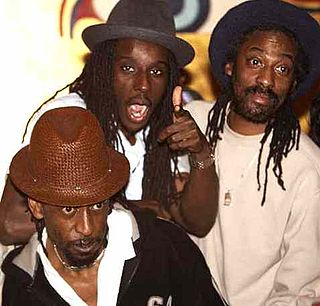
Aswad are a British reggae group, noted for adding strong R&B and soul influences to the reggae sound. They have been performing since the mid-1970s, having released a total of 21 albums. Their UK hit singles include the number one "Don't Turn Around" (1988) and "Shine" (1994). "Aswad" is Arabic for "black". They are three-time Grammy Award nominees.

The Congos are a reggae vocal group from Jamaica which formed as the duo "Ashanti" Roy Johnson (tenor) and Cedric Myton (falsetto), later becoming a trio with the addition of Watty Burnett (baritone), and have been active on and off from the mid-1970s until the present day. They are best known for their Heart of the Congos album, recorded with Lee "Scratch" Perry.
The Black Ark was the recording studio of reggae and dub producer Lee "Scratch" Perry, built in 1973 and located behind his family's home in the Washington Gardens neighborhood of Kingston, Jamaica. Despite the rudimentary set-up and dated equipment, it was nonetheless the breeding ground for some of Jamaica's most innovative sounds and recording techniques in the latter half of the 1970s.
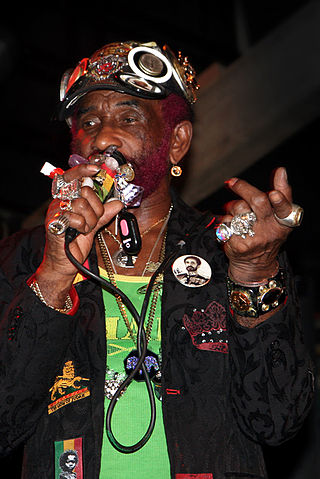
The Upsetters was the name given to the house band for Jamaican reggae producer Lee "Scratch" Perry. The name of the band comes from Perry's nickname of Upsetter, after his song "I Am the Upsetter", a musical dismissal of his former boss Coxsone Dodd.
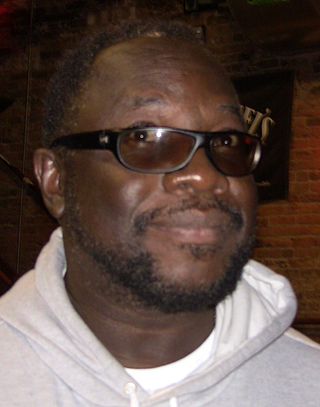
Neil Joseph Stephen Fraser known by his stage-name Mad Professor, is a Guyanese-born British dub music producer and engineer known for his original productions and remix work. He is considered one of the leading producers of dub music's second generation and was instrumental in transitioning dub into the digital age. He has collaborated with reggae artists such as Lee "Scratch" Perry, Sly and Robbie, Pato Banton, Jah Shaka and Horace Andy, as well as artists outside the realm of traditional reggae and dub, such as Sade, Massive Attack, The Orb, Gaudi, the Brazilian DJ Marcelinho da Lua, Grace Jones, and Perry Farrell.

Animal Kwackers was a children's television series produced by Yorkshire Television and broadcast on Britain's ITV in the 1970s.

Heart of the Congos is a roots reggae album by the Congos, produced by Lee "Scratch" Perry at his Black Ark studio with a studio band including Boris Gardiner on bass and Ernest Ranglin on guitar. The album was released in 1977. It is noted as being one of Perry's masterpiece productions of the Black Ark era.

Revolution Dub is a studio album by Jamaican dub producer Lee Perry and his studio band The Upsetters, released in 1975 by Cactus. The album, which features nine pared down dubs, was the last in a line of releases that year in which Perry began exploring the possible studio techniques at his recently opened studio Black Ark in Kingston, Jamaica. In addition to making early use of a drum machine, the album is characterised by unpredictable drops in the beat, drastic stereo panning and samples of dialogue from television series, particularly British sitcoms, while Perry sings on the album in an eccentric falsetto and portrays different personas, including television characters from Kojak and Doctor on the Go.
"Police and Thieves" is a reggae song first recorded by the falsetto singer Junior Murvin in 1976. It was covered by the punk band The Clash and included on their self-titled debut album released in 1977.
Michael George Henry OD, better known as Ras Michael, is a Jamaican reggae singer and Nyabinghi specialist. He also performs under the name of Dadawah.

Earl "Chinna" Smith, a.k.a. Earl Flute and Melchezidek the High Priest, is a Jamaican guitarist active since the late 1960s. He is most well known for his work with the Soul Syndicate band and as guitarist for Bob Marley & the Wailers, among others, and has recorded with many reggae artists, appearing on more than 500 albums.
The Skatalites are a ska band from Jamaica. They played initially between 1963 and 1965, and recorded many of their best known songs in the period, including "Guns of Navarone." They also played on records by Prince Buster and backed many other Jamaican artists who recorded during that period, including Bob Marley & The Wailers, on their first single "Simmer Down." They reformed in 1983 and have played together ever since.
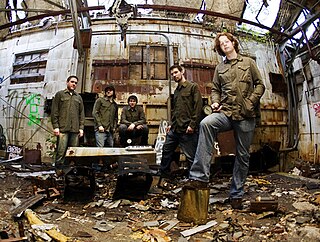
Destroy Babylon are a Boston, Massachusetts based band originally from Hudson, New Hampshire. Formed in 2001, their music is influenced by a wide range of styles, including post-punk, dub, Jamaican backing bands, and 1960's psych and prog rock.
Subatomic Sound System, founded in 1999 by Emch and Noah Shachtman, is an American record label and collective hosting musicians, producers, DJs, and visual artists from a variety of backgrounds and traditions. In late 2008, Subatomic Sound System garnered international attention for a limited edition vinyl 12" featuring their collaboration with Vienna's Dubblestandart and dub inventor Lee "Scratch" Perry, releasing the first songs from Perry in the dubstep genre, one of the first recorded examples of a tangible connection between the popular UK-based electronic genre that emerged in the early 2000s and the Jamaican dub from the 1970s, where dubstep's origins were rooted and which had been primarily originated by Perry himself.

Giant Panda Guerilla Dub Squad is an American reggae and jam band from Rochester, New York, founded in 2001 and known for their live performances and authentic roots reggae and dub sound.
Tony Braunagel is an American drummer, producer, and songwriter from Houston, Texas, United States, who is based in Los Angeles, California. Braunagel has played on many film scores and television shows as well as numerous albums as a musician, composer and producer. He is best known as a session drummer and/or percussionist of over 200 albums including those of Otis Rush, Eric Burdon, Johnny Nash, Coco Montoya, Lucky Peterson, as well as Grammy winning albums of Bonnie Raitt, Taj Mahal, Buddy Guy (percussion) and for performing live with dozens of music icons including Bonnie Raitt, Rickie Lee Jones, BB King, Lightnin’ Hopkins, John Lee Hooker, Robert Cray, Bette Midler, Lyle Lovett, and Taj Mahal to name just a few.
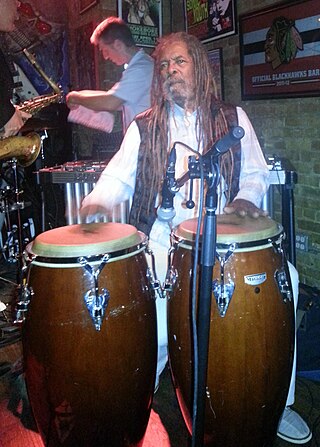
Larry McDonald is a Jamaican percussionist. He was born in Port Maria, Jamaica in 1937. McDonald played congas with Carlos Malcolm's band, Toots and the Maytals and the Count Ossie Band. He plays a wide variety of traditional percussion instruments.
Heron are an English folk-rock band who released two albums in the early-1970s and have continued to perform since reforming in the 1990s.












